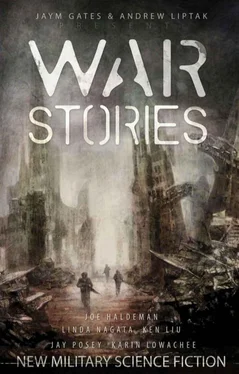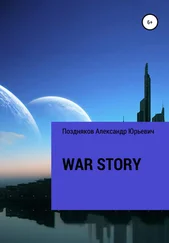“Dunna come any closer,” she said. “He might get mad at you.” Her brows shot up. “Is that fanta for me as well?”
“No,” Iguo said. He considered it. “Too much sugar is bad for you. You won’t grow.”
The imfizi shifted slightly and Iguo took a step back.
Belise laughed. “My baba used to say that.”
“My mother used to say it,” Iguo said. “When I chewed too much sugarcane.” He watched the drone uneasily. It was hard to tell where it was looking. “Did you have a mama ?” he asked her.
“I don’t remember,” Belise said. She rubbed at her nose, smeared snot on her dress.
“And your baba ?”
“He’s here.” Belise slapped the metal trunk behind her. “With me.”
“The imfizi keeps you safe, yes? Like a father.” Iguo maneuvered a rubber tire to sit on. Some of the scavengers down below were using a brazier for tea and the wind carried its bitter smoke. “But maybe it will not always be that way,” he said. “Drones are not so much like you and me, Belise. They can break.”
“They can fix,” Belise said, pointing to the patched carapace.
Iguo remembered much simpler jobs, where the men and women were frightened for their lives and wanted so badly to be tagged, to go to the safehouse, for the government to help them.
“If the drone decides its mission is over, it might leave,” Iguo said. “Or it might paint you.”
“Paint me?”
“Paint you a target,” Iguo said. “So it can kill you.”
Belise shook her small white head, serene. “No, that won’t happen. He’s my baba .”
Iguo sipped until his drink was gone. “I’ll take you to a place with so much food,” he said. “No more scrap–hunting. Nice beds and nice food. And other children.”
“I’ll stay.” Belise pointed and Iguo followed her finger. “Take those two. You can have them go with you. I don’t like them.”
Two small boys rummaging in the junk, insect–thin arms. One had a hernia peeking out from under his torn shirt. They cast nervous looks up every so often, for the leviathan drone and the albino girl and now for the policeman.
“They don’t need my help,” Iguo said. “My job is to help you. Many people would try to kill you. Cut off your limbs. The government is trying to make you safe.”
“Why?”
Iguo rubbed his forehead. “Because albino–killings are very publicized. President Dantani is forging new Western relations, and the killings reflect badly, badly, badly on our country. And now that the war is over, and there are no more rebels to hunt, people who know only how to murder are finding the muti market.”
“Oh.”
“And the government cares for the good of all its people,” Iguo added. He looked at the empty glass bottle between his palms, then hurled it off into the growing dusk. The shatter noise came faint. Belise had followed the trajectory, lips pursed. Now she looked up.
“Not what my baba said.” She paused. “About the government. He said other things.”
“Your baba is dead, Belise.”
Belise nodded, and for a moment Iguo thought they were making progress. “He died with the bleeding,” she said. “With the sickness. But he told me not to worry, because he had a plan. He made his soul go softly into the imfizi .” She smiled upward, and the pity in Iguo’s gut sharpened into something else. He stared at the array of red sensors, the scattered spider eyes.
“Your daddy, Belise.” Iguo put a finger up to his temple and twisted. “Was he a jackman?”
Belise winced. She stared at the ground. When she looked up, her raw pink eyes were defiant. “He was a rebel,” she said.
§
Back in the birdshit–caked taxi, there was a memo on misuse of government funds. Iguo tugged it off the screen and punched in his address instead. Through the window, he saw scavengers taking in their equipment. Some were pitching nylon tents around the brazier. The old noseless man was tearing open a package of disposable phones, but he looked up when the ignition rumbled. He waved.
Iguo’s fingers buzzed as he typed the word into Google: softcopy . A slew of articles in English and German fluttered up. He struggled through half a paragraph before switching over to a translation service. Iguo was not a hacker, but he’d heard the term used. Always between jackmen, usually in a hot argument.
The taxi began to rattle over loose–packed gravel, and Iguo had it read aloud to him. Softcopy, a theoretical transfer of human consciousness into an artificial brain. Ramifications for artificial intelligence. Softcopy claim in NKorea revealed to be a hoax. Increased use of neural webbing has led to new questions. Evolution of the human mind.
The taxi sent him an exposé on corruption in the Burundi police forces as a kicker, but Iguo hardly registered it as he swung himself out of the vehicle. He scanned himself through the door in the jagged–glass–topped wall, scattered the pigeons on his apartment’s stoop. The stairs went by three at a time, and then he was in front of his work tablet, working the policense like a bludgeon.
He pulled up reports from three years ago. Death reports. The list was long, long, long. He scrolled through it and they came to him in flashes, so many Jonathans and then so many Josephs, good Christian names for godless rebels, and then he found him: Joseph Rufykiri, the Razor. Responsible for the longest sustained information attack of the war, for the interception of encrypted troop movements, for the malicious reprogramming of military drones, farm equipment, wind turbines, and once a vibrator belonging to the general’s wife.
He was dead by na–virus, but survived by an albino daughter. Iguo stared at the data and only half–believed it, but half was enough. He found a rumpled rain jacket under the bed and threw it on, and into the deepest pocket he dropped his old service handgun. Useless, unless he put it right up to the drone’s gut, right where the armor had fallen away.
Iguo thought of the blood spray and his comrades jerking and falling like cut puppets as the hacked drone spun its barrels. He thought of Joseph Rufykiri between blood–soaked sheets, whispering to his daughter that he had a plan and that she did not have to worry.
He had to know, so Iguo stepped back out under the swelling sky and hailed a new taxi, one with less graffiti, as it began to storm.
§
The dust felt like flying shrapnel by the time Iguo struggled out of the taxi, wrapped up to the eyes. It battered and bit his fingers. The sky was dark and its rusty clouds were surging now, attacking. It looked like the scavengers had packed away and found shelter elsewhere, or else their tents had been torn off like great black scabs. Iguo hurried to where the junk pile could provide some shelter.
On his way a scavenger fled past, stumbling, and then Iguo saw the blurry shape of a jeep up ahead through the sand. Something besides the storm was happening. He crouched against the wheel–well and checked his gun where the dust couldn’t reach it. He checked it again. He breathed in, out, and craned his head around the edge of the vehicle.
Three muti hunters, swathed in combat black with scarves wrapped tight against the storm. Iguo counted three small–caliber guns but could hear nothing now over the howl of the dust. They ducked and swayed on their feet, and the imfizi drone clanked and churned and tried to track them as the grit assaulted its many joints. Bullets had cratered its front, and bled coolant was being sucked off into the wind. Belise was nowhere to be seen.
The drone was long since dry of ammunition, and the hunter was caught off–guard when it lunged, quicker than Iguo had ever seen a drone move, and pinioned him to the ground. The other two rounded on it, firing in rhythm. The imfizi buckled and twitched with the impacts, but then reared up with the hunter’s leg still mashed in its pincer. Reared higher. Higher. Blood spouted as the man tore silently in half.
Читать дальше












